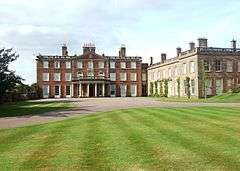Henry Bridgeman, 1st Baron Bradford
Henry Bridgeman, 1st Baron Bradford (7 September 1725 – 5 June 1800),[1] known as Sir Henry Bridgeman, 5th Baronet between 1764 and 1794, was a British politician who sat in the House of Commons for 46 years from 1748 to 1794 when he was raised to the peerage as Baron Bradford.
Sir Henry Bridgeman, 5th Baronet, 1st Baron Bradford | |
|---|---|
| Baron Bradford | |
 Weston Park | |
| Successor | Orlando Bridgeman, 1st Earl of Bradford |
| Other titles | 5th Baronet Bridgeman of Great Lever |
| Born | 7 September 1725 |
| Died | 5 June 1800 (aged 74) Old Burlington Street, London |
| Buried | Weston Park |
| Spouse(s) | Elizabeth Simpson |
| Issue | |
| Parents | Sir Orlando Bridgeman, 4th Baronet Lady Anne Newport |
Background and education
Bridgeman was the second and eldest surviving son of Sir Orlando Bridgeman, 4th Baronet.[2] [3] His mother Anne was the daughter of Richard Newport, 2nd Earl of Bradford.[2] He was educated at Queens' College, Cambridge, where he graduated with an MA in 1747.[4] On the death of his uncle Thomas Newport, 4th Earl of Bradford in 1762 Bridgeman inherited Weston Park and two years later he succeeded his father as baronet.[5] Cambridge awarded him a Doctor of Laws in 1769 and the University of Oxford made him a Doctor of Civil Laws in 1793.[5]
Career
In 1748, Bridgeman entered the British House of Commons, having been elected for Ludlow.[3][6] He represented the constituency for twenty years until 1768 and sat then for (Much) Wenlock for another twentysix years.[6] Bridgeman retired as Member of Parliament in 1794 and was elevated the Peerage of Great Britain with the title Baron Bradford, of Bradford, in the County of Shropshire on 13 August.[7] He was nominated clerk of the household to George, Prince of Wales, a post he held until the latter's accession in 1760.[6] A year later he was chosen clerk comptroller of the Board of Green Cloth, serving for the following three years.[5] In 1774 Bridgeman became recorder for Much Wenlock, an appointment for life.[6]
Family
Bridgeman married Elizabeth Simpson, daughter of Reverend John Simpson on 12 July 1755; they had eight children, five sons and three daughters.[2] He died, aged 74, in Old Burlington Street in London in 1800[8] and his two oldest sons having predeceased him was succeeded in his titles by his third son Orlando, later raised to an earl.[1] His fourth son John took over his seat in Parliament and assumed the surname Simpson.[3][6][9] Bridgeman was survived by his widow until 1806; she died in Bath, Somerset and was buried in Weston (Weston All Saints?).[8]
Notes
- Doyle" (1886), p. 208
- Debrett (1828), p. 240
- BRIDGEMAN, Henry (1725-1800), of Weston Park, Staffs. Published in The History of Parliament: the House of Commons 1715-1754, ed. R. Sedgwick, 1970. Accessed May 2020.
- "Bridgeman, Henry (BRGN744H)". A Cambridge Alumni Database. University of Cambridge.
- Cokayne (1912), p. 275
- Thorne (1986), p. 253
- "No. 13692". The London Gazette. 9 August 1794. p. 818.
- Cokayne (1912), p. 276
- BRIDGEMAN (afterwards SIMPSON), John (1763-1850), of Babworth, Notts. Published in The History of Parliament: the House of Commons 1754-1790, ed. L. Namier, J. Brooke., 1964. Accessed May 2020.
References
- Doyle, James William Edmund (1886). The Official Baronage of England. vol. I. London: Longmans, Green & Co.
- Cokayne, George Edward (1912). Vicary Gibbs (ed.). The Complete Peerage of England, Scotland, Ireland, Great Britain and the United Kingdom. vol. II. Exeter: William Pollard Co. Ltd.
- Thorne, R. G. (1986). The House of Commons, 1790–1820. vol. I. London: Secker & Warburg. ISBN 0-436-52101-6.
- Debrett, John (1828). Debrett's Peerage of the United Kingdom of Great Britain and Ireland. vol. I (17th ed.). London: G. Woodfall.
| Parliament of Great Britain | ||
|---|---|---|
| Preceded by Richard Herbert Sir William Corbet, 5th Baronet |
Member of Parliament for Ludlow 1748–1768 With: Richard Herbert 1748–1754 Edward Herbert 1754–1768 |
Succeeded by Edward Herbert William Fellowes |
| Preceded by Cecil Forester Brooke Forester |
Member of Parliament for (Much) Wenlock 1768–1794 With: George Forester 1768–1780, 1780–1784, 1785–1790 Thomas Whitmore 1780 John Bridgeman 1784–1785 Cecil Forester 1790–1794 |
Succeeded by Cecil Forester John Simpson |
| Peerage of Great Britain | ||
| New creation | Baron Bradford 1794–1800 |
Succeeded by Orlando Bridgeman |
| Baronetage of England | ||
| Preceded by Orlando Bridgeman |
Baronet (of Great Lever) 1764–1800 |
Succeeded by Orlando Bridgeman |